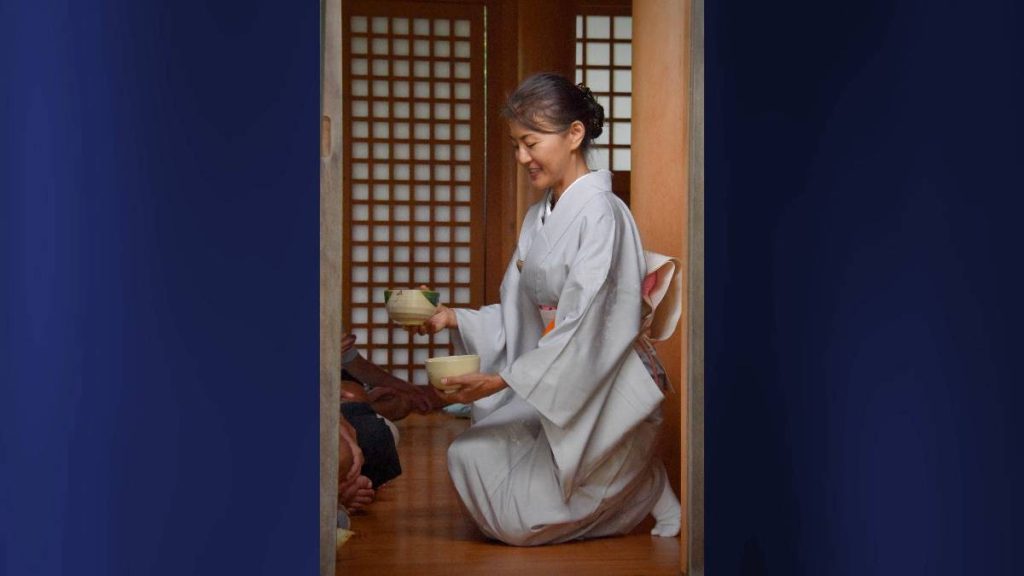Lāwa‘i International Center offers rare glimpse into traditional Japanese tea ceremony

In the Hall of Compassion, a hand-carved Buddhist temple that was built in 2014 but based on 13th-century designs, a woman sitting behind a low table prepared a cup of tea for two women sitting on either side of her during a traditional Japanese ceremony.
The preparer’s movements were slow and methodical, yet graceful, as she ladled hot water into a bowl-like teacup filled with verdant matcha, or powdered green tea.
She then picked up a small bamboo whisk. As she stirred the matcha into the hot water, the faint whirring of the whisk was the loudest noise in the temple.
The woman frequently wiped her instruments with a scarlet kerchief tucked into her colorful kimono. Her friends, after drinking the tea, carefully cleaned the space where their lips had touched the old ceramic cups.
On this day, May 27, the public had the rare opportunity to experience a Japanese tea ceremony at the Lāwa‘i International Center – a multicultural, nondenominational organization on the south side of Kaua’i that stewards a 32-acre parcel home to an ancient Hawaiian heiau (temple), and one of the oldest Buddhist temple sites in the United States.
During the three 15-minute ceremonies conducted by the Urasenke Kaua’i Kyoukai Tea Association, the Hall of Compassion was silent except for the words spoken by one of three kimono-clad women standing at the head of the temple’s open-air room.
The woman’s words were nearly inaudible, swallowed by birdsong and the soft hum of the nearby Kaumuali‘i Highway.
“It’s more than the words of the person speaking. Don’t worry if you cannot hear her,” said Lynn Muramoto, president of the Lāwaʻi International Center.
For about 10 years, the Urasenke Kaua’i Kyoukai Tea Association has performed annual public Japanese tea ceremonies at the center.
“This is your time to feel your spirit out of the energy of these ladies,” Muramoto said. “This is their meditation. While you’re here, your heart and your soul is moving with all as they pass the teacup across the room to serve you. It’s the way their kimono drapes along their bodies. This is all part of their meditation that you will be graced with today.”
Each tea ceremony was followed by a serving of dorayaki (sweet red bean pancake) and usucha, a thin tea prepared with a whisk.

It was a rare glimpse into an ancient tradition. A traditional tea ceremony usually lasts at least two hours in Japan, where members of the general public would not be allowed into a Buddhist temple like the Hall of Compassion.
Tea Association member Ayumi Ditamore, a longtime practitioner of Japanese tea ceremony. said: “There are 100 ways to serve a bowl of tea.”
Weekly lessons can last from 9 a.m. to 4 p.m. The complex ritual, however, is not about the beverage. For the Urasenke Kaua’i Kyoukai Tea Association, it is a way to maintain a connection to their old home. Each of its 15 members was born in Japan.
“It’s the root we all want to have,” said Ditamore, now a resident of Princeville. “We’re all in a foreign country … We gather and share the roots of Japan. It’s an oasis.”
After each of the ceremonies ended, attendees were invited to visit an open-air tent for free homemade pūpūs (appetizers) and more tea. Meanwhile, Tea Association members carefully cleaned the heirloom teacups they had served to the public. It was a big operation, with several trucks filled with equipment parked nearby.
According to Muramoto, the final cleaning of the heirloom teacups may have marked the end of public tea ceremonies at the Lāwaʻi International Center.
“Every year, they say this might be their last year, because many of them are in their 80s,” she said. “This takes 15 ladies in the back, working hard.”
The Lāwa‘i International Center perhaps best known for the 88 Shingon shrines lining a path cut into the property’s hillside. Built by Japanese plantation workers in 1904, the shrines are a miniature representation of the Shikoku Pilgrimage, a 1,000-mile-long route on the Japanese island of Shikoku. At the entrance to the shrines’ pathway is the Hall of Compassion.
Lāwaʻi International Center volunteer Brendan Smith teaches math and physics at Waimea High School. He studied under the Urasenke Kaua’i Kyoukai Tea Association for several months to improve his Japanese language skills.
“Japanese tea ceremony is intertwined with Japanese culture, particularly Zen culture,” Smith said.
He gestured toward a set of Japanese characters painted on the rear wall of the Hall of Compassion. They spell “Ichi-go,” a famous expression within Japanese tea and Zen cultures.
“It pretty much says, the one time that we’re meeting is happening now,” Smith said. “If you were to have even the same group of people doing tea ceremony, again, they would have changed.”
Ditamore, for one, has no intention of stopping her practice of Japanese tea ceremony.
“It’s a lifetime,” she said. “We are all lifetime students.”
Those interested in joining the Urasenke Kaua’i Kyoukai Tea Association may email Kiyoko Coan at kiyokoco@gmail.com.
For more information about the Lāwaʻi International Center, including community workdays and visiting hours, click here.











